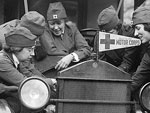The Northeast branch of the National Archives provides access to historic documents from the states of New York, Rhode Island, New Hampshire, Vermont, Connecticut, New Jersey, and Massachusetts, in addition to Puerto Rico and the U.S. Virgin Islands. Research can be conducted at two main locations in Boston, Massachusetts, and New York City, as well as within a microfilm research area in Pittsfield, Massacusetts (Silvio O. Conte National Records Center, 10 Conte Drive).
The Boston/Waltham Location
The Boston-area archives holds documents from 1780 to present pertaining to the states of Connecticut, Rhode Island, New Hampshire, Vermont, Maine, and Massachusetts. Records include, but are not limited to, census and naturalization records, Dawes Commission final cards of the Five Civilized Tribes, Chinese Exclusion cases, and passenger arrival lists.
Waltham, Massachusetts
Topics of emphasis within the collection include port commerce, desegregation, War of 1812, the Amistad case, naval stations, lighthouses, the Chinese Exclusion Act, MIT and Harvard World War II research projects, and arms manufacturing. With so much information at your fingertips, a pre-visit look through the available finding aids may be a wise time investment.
Interested in researching military records or conducting genealogical research? Access a listing of upcoming genealogical workshops. All workshops are free, but require advance registration.
Just for Students and Educators, Boston/Waltham
Earn PD points by attending five free, monthly Thursday night programs for educators, or attend other in-service teaching with document programs. Access the calendar to plan which events to attend. Large groups can request that workshops be conducted at their own location.
In the Boston area? Plan a free, hands-on archival field trip for your class, be it kindergarten or high school. Programs are customizable, designed to meet state curriculum standards, and include a behind-the-scenes tour. Example programs address the 54th Mass. Colored Regiment, the Revolutionary War, Eleanor Roosevelt and Marian Anderson, the Constitution, and migration and immigration. Please schedule ahead. The site is handicap-accessible and contains a lunchroom.
The phone and fax numbers to the left are for the Boston/Waltham location.
The NYC Location
The New York City location holds documents from 1695 through the 1990s pertaining to New York, New Jersey, Puerto Rico, and the U.S. Virgin Islands. Online finding aids are an excellent way of determining whether or not the archives may have the type of documents which you desire.
New York City
The archives offers an extensive series of public programs, including tours conducted upon request, open houses, and workshops. Workshop topics can include census records, Chinese Americans, customs records, maritime history, Civil War prize cases, and more.
Just for Students and Educators, New York City
Attend free professional development workshops appropriate for teachers (including home school teachers) and administrators.
Consider ordering a free CD correlating the contents of Our Documents to New Jersey and New York educational standards.
You can also schedule K-12 field trips complete with hands-on research and tours of the archives' facility.
Online Resources
The Northeast archives hosts a collection of online exhibits, ranging in topic from the real life von Trapp family to the Slocum tragedy.
Finally, download packets consisting of documents, transcriptions, related questions and activities, and information on how the topic relates to the standards. Teachable Texts is upgraded regularly.

